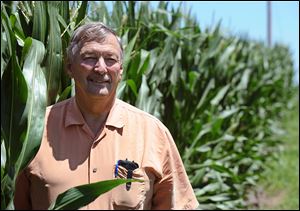
Agriculture industry seeking to create ‘right-to-farm’ law
Ag industry seeks to create right to farm for legal protection against animal-welfare groups
7/12/2014
Neal Bredehoeft of Alma, Mo., a corn and soybean farmer, supports his state’s effort to make farming a right. The agricultural industry wants farming rights to be written into law, alongside the freedoms of speech and religion.
JEFFERSON CITY, Mo. — In the nation’s agricultural heartland, farming is more than a multibillion-dollar industry that feeds the world. It could be on track to become a right, written into law alongside the freedom of speech and religion.
Some powerful agriculture interests want to declare farming a right at the state level as part of a wider campaign to fortify the ag industry against crusades by animal-welfare activists and opponents of genetically modified crops.
The emerging battle could have lasting repercussions for the nation’s food supply and for the millions of people worldwide who depend on U.S. agricultural exports. It’s also possible that the right-to-farm idea could sputter as a merely symbolic gesture that carries little practical effect beyond driving up voter turnout in local elections.
“A couple of years from now, we might say this was the beginning of the trend,” said Rusty Rumley, a senior staff attorney at the National Agricultural Law Center in Fayetteville, Ark. But “we really don’t even know what they’re going to mean.”
Animal advocates and other groups are increasingly urging consumers, grocers, and restaurants to pay as much attention to how their food is raised as to how it tastes. Their goals include trying to curtail what they consider cruel methods of raising livestock and unsafe ways of growing food.
Those efforts are helping to fuel the right-to-farm movement in the Midwest, where the right has already won approval in North Dakota and Indiana. It goes next to Missouri voters in an Aug. 5 election.
Missouri’s proposed constitutional amendment asks voters whether the right “to engage in farming and ranching practices shall be forever guaranteed.”
Indiana’s new measure — which was written into state law but not enshrined in the constitution — protects the rights of farmers to use “generally accepted” practices, including “the use of ever-changing technology.” The North Dakota measure prohibits any law that “abridges the right of farmers and ranchers to employ agricultural technology, modern livestock production and ranching practices.”
Supporters hope the wording provides a legal shield against initiatives that would restrict particular farming methods, such as those modeled after a California law setting minimum cage space for hens or policies in Florida and Ohio that bar tight pens for pregnant pigs. Others hope to pre-empt any proposals to ban genetically modified crops similar to ones recently passed in southern Oregon.
“Agriculture’s had a lot folks that’s been trying to come down on our farms and tell us what we can and cannot do,” said Neal Bredehoeft, a corn and soybean farmer who supports the Missouri measure.
Opponents fear the right-to-farm measures could be cited by corporate farms to escape unwanted regulations against pollution and unsanitary conditions.
“This is a fight in each state,” said Joe Maxwell, a former Missouri lieutenant governor who is the Humane Society’s vice president of outreach and engagement.